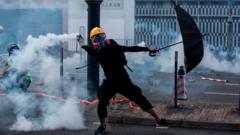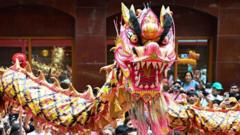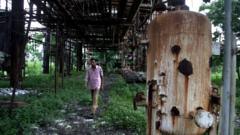The once bustling epicenter of pro-democracy protests, Hong Kong, faces a quiet but relentless erasure of its spirited identity as the memories of activism fade against the backdrop of increased restrictions under Chinese governance. Perspectives from local activists reveal a palpable sense of loss intertwined with a persistent commitment to remembering and preserving their city's essence.
The Resonance of Defiance: Hong Kong's Battle to Preserve Its Identity Amidst Cracks of Conformity

The Resonance of Defiance: Hong Kong's Battle to Preserve Its Identity Amidst Cracks of Conformity
A look into the memories of Hong Kong's pro-democracy protesters as they navigate a shifting landscape shaped by Beijing's tightening grip, echoing a past marked by vibrant activism.
As Kenneth wandered through Victoria Park—the historical heart of Hong Kong’s pro-democracy protests—he couldn’t shake the memories flooding back. The park, once filled with vibrant calligraphy stalls and passionate vigils for the Tiananmen massacre, now stood as a monument to the city’s political metamorphosis. In the past decade, Kenneth, a former activist who hesitated to disclose his identity, articulated the fading hopes for a vibrant, free-spirited Hong Kong. “People are leading their lives… but the essence of our city is quietly disappearing,” he lamented.
While visually, Hong Kong seems unchanged, a closer examination reveals the pervasive presence of Beijing’s influence—skyscrapers adorned with reminders of the motherland and an increasing use of Mandarin displacing Cantonese. Amidst a city of over seven million, it remains unclear how many individuals truly embrace this shift, but tens of thousands rallied since 2014 in a robust fight for democracy. Despite disagreements over the movement's direction, the consensus resounded clear: Beijing had decisively quelled it.
The tumultuous decade reached a somber crescendo as remnants of the movement faced destruction under the national security law (NSL), which incited a mass exodus from disillusioned locals. Some, like Kenneth, remain, embodying resilience in a landscape of challenge. A decade ago, the 2014 Umbrella Movement sowed seeds of resistance, bringing forth prominent figures such as Joshua Wong and Benny Tai, who envisioned a future illuminated by democratic ideals. Despite their efforts, the fate of Hong Kong has continued its downward spiral towards conformity.
Years later, Tai, imprisoned for his activism, along with others, faces trials that echo the still-closed chapters of political discourse. Defiant voices like Jimmy Lai, despite imprisonment, strive to articulate the very essence of Hong Kong—liberty and the struggle for free speech that once flourished. Yet, outside courtrooms, the spectacles of resistance have diminished, showcasing a city gently subdued by the apparatus of control.
Critics assert that China’s reprisal against Hong Kong dismantles the promises made at the 1997 handover, contravening their own principles while critics abroad observe with concern. Chan Kin-man, a co-architect of the Umbrella Movement, carries the weight of memories from a time when change felt tangible. Living in Taiwan now, he grapples with the idea of failure as the city he once fought for transforms into a mirror of mainland cities.
For countless individuals straddling the old Hong Kong and an unsure future, the prospect of forgetting their roots feels unbearable. Kenneth commemorated the unwelcome reality of self-censorship and constant surveillance, noting that “red lines” can appear suddenly with severe repercussions. The recent festival in Victoria Park marked contrasts from prior years filled with spirited commemoration of resistance.
Similarly, for those residing abroad, nostalgia is tinged with melancholy. Kasumi—now settled in the UK—recounts a bittersweet journey as her daughter grows up in a world steeped in unfamiliar narratives. The colors of Hong Kong’s sea may glisten sweetly in her memory, but changes reflect the broader, pain-stirring metamorphosis of identity.
As the chapters of Hong Kong's remarkable story unfold, both Kenneth and Kasumi exemplify the resilience and strong spirit of individuals refusing to abandon the essence of their home, fueled by the unwavering desire to uphold a memory that stubbornly resists erasure. Whether through quiet acts of remembrance or deep-rooted familial teachings, the heartbeat of Hong Kong pulses on, echoing its indomitable will to preserve its core in the face of daunting challenges.





















